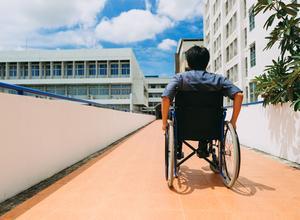How Divorce Affects Disability Benefits
 When one person in a marriage is eligible to receive federal disability benefits, both spouses may come to rely upon the payments. The benefits are meant to make up for the spouse’s inability to secure employment. If the couple divorces, the disabled spouse will likely see his or her disability benefits unaffected or increased. The non-disabled spouse may individually receive benefits, depending on which program the disabled spouse is using.
When one person in a marriage is eligible to receive federal disability benefits, both spouses may come to rely upon the payments. The benefits are meant to make up for the spouse’s inability to secure employment. If the couple divorces, the disabled spouse will likely see his or her disability benefits unaffected or increased. The non-disabled spouse may individually receive benefits, depending on which program the disabled spouse is using.
SSI vs. SSDI
Any person age 65 or older or an adult with a qualifying disability may apply for Supplemental Security Income (SSI) and Social Security Disability Income (SSDI). The difference between the two has to do with work experience and financial need:
- Disabled adults earn SSDI benefits by accumulating work credits at jobs where they contributed to social security. A spouse and dependent children can receive auxiliary benefits; and
- Disabled adults who have not accumulated work credits can apply for SSI if they can show that they do not have sufficient financial resources to support themselves.
An adult can qualify for both SSI and SSDI if SSDI benefits do not meet the minimum payments that would be required when receiving SSI benefits. In each program, the disabled adult is applying as an individual, though being married can affect the application process.
SSI After Divorce
First of all, married people can have difficulty qualifying for SSI because of their spouses’ incomes. If a spouse makes enough money to support a disabled adult, the federal government may not see a need for SSI benefits. After a divorce, SSI benefits will likely increase for disabled adults because they no longer have their spouses’ incomes to rely on. Spousal support payments will factor into their SSI benefits, but support payments are only a fraction of what the disabled adult was required to claim as income while married.
SSDI After Divorce
SSDI benefits will not change because they are separate from the disabled adult’s income. However, the non-disabled spouse can receive the same benefits as long as he or she:
- Is at least 62 years old;
- Was married to the disabled adult for at least 10 years;
- Has not remarried; and
- Is not eligible for social security benefits that are of equal or greater value.
A former spouse’s claim to SSDI benefits will not detract from what the disabled spouse receives.
Disability and Divorce
It is possible for both spouses to benefit from federal disability programs after a divorce. A Kane County divorce attorney at Goostree Family Law can discuss how your divorce will affect your disability benefits. To schedule a free consultation, call 630-584-4800.
Source:
https://www.ssa.gov/planners/disability/dfamily3.html











